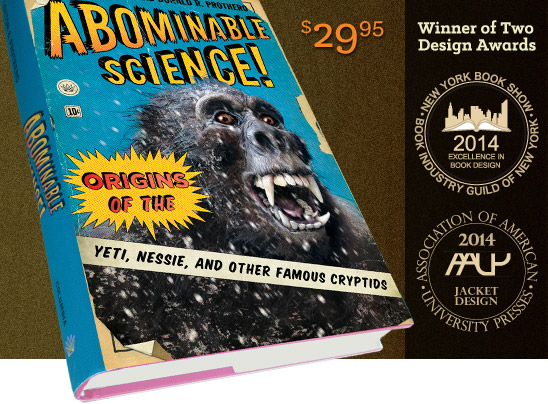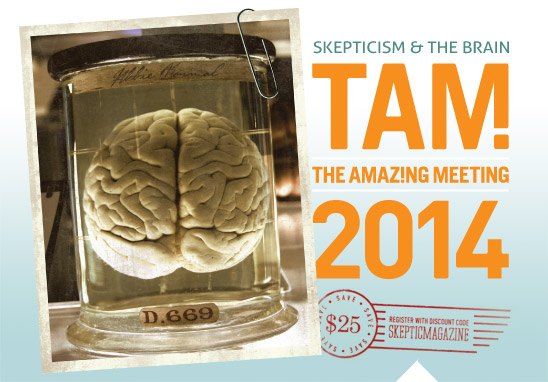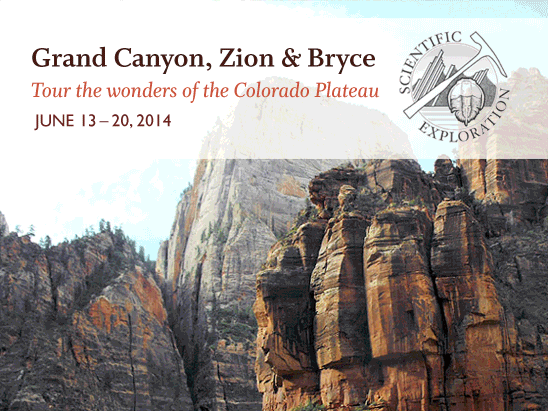In this week’s eSkeptic:
- Abominable Science: Winner of Two Design Awards in 2014!
- Skepticality: Do The Most Good
- Feature: The Great Dilution Delusion
- Rent a Science Lecture for $3.95: Stephen Jay Gould: Evolution Revolution
- The Amazing Meeting 2014: July 10–13, South Point Casino, Las Vegas
- Our Next Geology Tour: Grand Canyon, Zion & Bryce (Jun. 13–20, 2014)
Celebrating excellence in book design
We are very pleased and excited to announce that Abominable Science!: Origins of the Yeti, Nessie, and Other Famous Cryptids, a book by the Skeptics Society’s own Daniel Loxton and Donald Prothero, is the winner of not one, but two, prestigious design awards this year! One award, honoring and celebrating excellence in book design (including interior design, jacket design, production design, binding materials, paper choice, etc.), will be presented at the 28th Annual New York Book Show, the premier event presented by the Book Industry Guild of New York. The other award, for book jacket design, was won at the Association of American University Presses (AAUP) Book, Jacket, and Journal Show.
Cover design: Philip Pascuzzo
Cover image: Daniel Loxton
Book design: Vin Dang

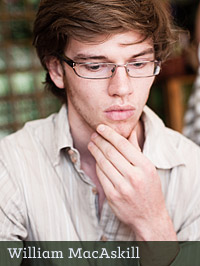
Do The Most Good
SKEPTICALITY EPISODE 231
You‘ve got 80,000 hours in your career. How can you use them to solve the world’s most pressing problems? This week on Skepticality, Derek has a conversation with William MacAskill: a former Fulbright scholar at Princeton University, PhD at Oxford University, and founder of the Oxford’s Center for Effective Altruism and co-founder of 80,000 Hours, a service which helps you determine how best to use your time to do the most good. As a person who is deeply concerned with the effects of charitable giving, MacAskill set out to provide ways for people to give in the most effective manner possible. He discusses why it was important, for the charities he helped create, to have a scientific way to determine where funding and effort should best be directed for the most good.
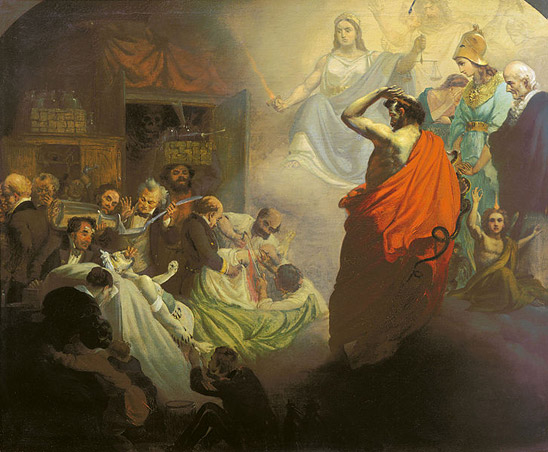
1857 painting by Alexander Beydeman (1826–1869) depicting historical figures and personifications of homeopathy, including the founder of homeopathy, Christian Friedrich Samuel Hahnemann (far right), observing the perceived brutality of allopathic medicine of the 19th century. Source.
About this week’s eSkeptic
You might ask why, as skeptics, we must continue to fight the same battles against quackery over and over again, long after the nonsense has been debunked. The short answer: because belief in nonsense persists. In this week’s eSkeptic, we present one of James Randi ’Twas Brillig… columns from Skeptic magazine issue 10.1 (2003), about the persistence of homeopathy, entitled: “The Great Dilution Delusion.”
You may also be interested in downloading our free PDF on Alternative Medicine by Harriet Hall, M.D. (The SkepDoc).
Share this article with friends online.
Subscribe | Donate | Watch Lectures | Shop
The Great Dilution Delusion
by James Randi
On November 27, 2002, the BBC-TV program Horizon, featuring a test of homeopathy, was broadcast in the UK. Many viewers expressed their conviction that we’d heard the deathknell of this form of quackery; I disagreed. To explain my reluctance to join the funeral procession, I offer readers this: Oliver Wendell Holmes (1809–1894) was a celebrated physician, poet, humorist and professor of anatomy and physiology at Harvard, as well as the father of O.W.H. Junior (1841–1935), who became a renowned justice of the U.S. Supreme Court. In 1842, Senior wrote an essay, “Homeopathy and Its Kindred Delusions,” which had originally been presented by him as two lectures to the Boston Society for the Diffusion of Useful Knowledge. I present here two excerpts from the essay, to illustrate just how little the situation has changed in the last 160 years.
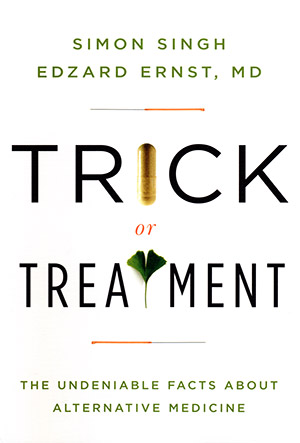
An Excellent Guide
to Understanding
Alternative Medicine
An excellent guide to the confusions and contradictions of alternative medicine written with clarity, integrity and authority. What works? Who can you trust? What alternative cures have positive results?…
In 1835 a public challenge was offered to the best-known Homeopathic physician in Paris to select any ten substances asserted to produce the most striking effects; to prepare them himself; to choose one by lot without knowing which of them he had taken, and try it upon himself or an intelligent and devoted Homeopathist, and, waiting his own time, to come forward and tell what substance had been employed. The challenge was at first accepted, but the acceptance was retracted before the time of trial arrived.
Sound familiar? In April of 1999, Nobel laureate Brian Josephson publicly challenged the American Physical Society (APS) to conduct tests of the claims of Dr. Jacques Benveniste in regard to homeopathy, at the same time predicting that the APS would fear to do so. I advised the APS to accept Josephson’s challenge, and they did so. They also offered to pay all costs of the tests. From that day to this— three years and seven months ago—we have not heard from either Brian Josephson, or Jacques Benveniste….
Holmes Senior concluded:
From all this I think it fair to conclude that the catalogues of symptoms attributed in Homeopathic works to the influence of various drugs upon healthy persons are not entitled to any confidence.
Exactly the decision I came to, long ago. But read on. Holmes, in his essay, described the thorough manner in which homeopathic claims had been examined. He compared the eventual results to those met with when magical “tractors”— devices said to “withdraw” diseases and invented by Dr. Elisha Perkins in 1801—were clearly shown to be pure quackery and yet persisted in Holmes’ time. Holmes:
Now to suppose that any trial can absolutely silence people, would be to forget the whole experience of the past. Dr. Haygarth and Dr. Alderson could not stop the sale of the five-guinea Tractors, although they proved that they could work the same miracles with pieces of wood and tobaccopipe. It takes time for truth to operate, as well as Homoeo–pathic globules. Many persons thought the results of these trials were decisive enough of the nullity of the treatment; those who wish to see the kind of special pleading and evasion by which it is attempted to cover results which, stated by the Homoeopathic Examiner itself, look exceedingly like a miserable failure, may consult the opening flourish of that Journal. I had not the intention to speak of these public trials at all, having abundant other evidence on the point. But I think it best, on the whole, to mention two of them in a few words—the one instituted at Naples and that of Andral.
There have been few names in the medical profession, for the last half century, so widely known throughout the world of science as that of M. Esquirol, whose life was devoted to the treatment of insanity, and who was without a rival in that department of practical medicine. It is from an analysis communicated by him to the Gazette Médicale de Paris that I derive my acquaintance with the account of the trial at Naples by Dr. Panvini, physician to the Hospital della Pace. This account seems to be entirely deserving of credit. Ten patients were set apart, and not allowed to take any [homeopathic] medicine at all—much against the wish of the Homoeopathic physician.
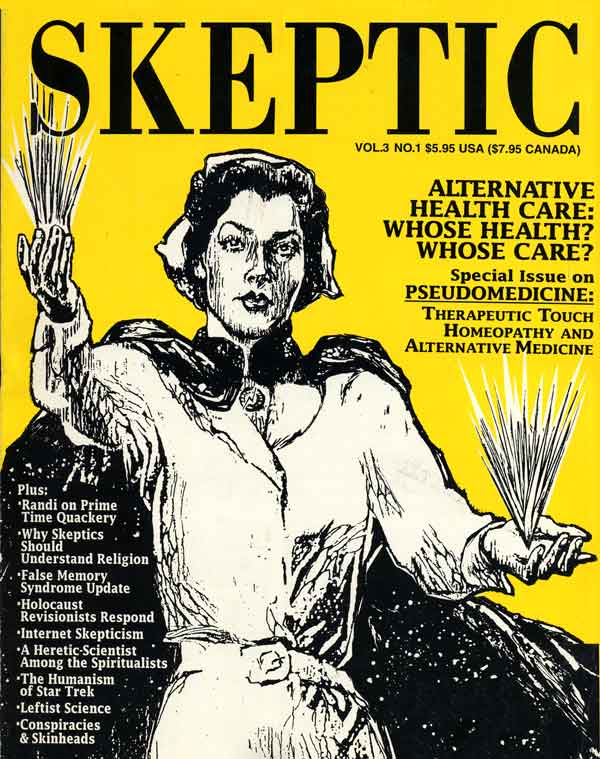
Skeptic issue 3.1: Pseudomedicine
Therapeutic Touch; Spiritual Belief Systems Compete as Alternatives to Scientific Health Care; Think Your Cancer Away; Speaking of Vitamins; Is Raw Meat Conscious?; Healing Cures and more…
All of them got well, and of course all of them would have been claimed as triumphs if they had been submitted to the treatment. Six other slight cases (each of which is specified) got well under the Homoeopathic treatment—but with none of its asserted specific effects being manifested. All the rest were cases of grave disease; and so far as the trial, which was interrupted about the fortieth day, extended, the patients grew worse, or received no benefit. A case is reported on the page before me of a soldier affected with acute inflammation in the chest, who took successively aconite, bryonia, nux vomica, and pulsatilla, [all popular homeopathic remedies, then and today] and after thirty-eight days of treatment remained without any important change in his disease.
The Homoeopathic physician who treated these patients was M. de Horatiis, who had the previous year been announcing his wonderful cures. And M. Esquirol asserted to the Academy of Medicine in 1835, that this M. de Horatiis, who is one of the prominent personages in the Examiner’s Manifesto published in 1840, had subsequently renounced Homoeopathy. I may remark, by the way, that this same periodical, which is so very easy in explaining away the results of these trials, makes a mistake of only six years or a little more as to the time when this trial at Naples was instituted.
M. Andral, the “eminent and very enlightened allopathist” [orthodox physician] of the “Homoeopathic Examiner,” made the following statement in March, 1835, to the Academy of Medicine:
“I have submitted this doctrine to experiment; I can reckon at this time from one hundred and thirty to one hundred and forty cases, recorded with perfect fairness, in a great hospital, under the eye of numerous witnesses; to avoid every objection I obtained my remedies of M. Guibourt, who keeps a Homoeopathic pharmacy, and whose strict exactness is well known; the regimen has been scrupulously observed, and I obtained from the sisters attached to the hospital a special regimen, such as Hahnemann orders. I was told, however, some months since, that I had not been faithful to all the rules of the doctrine. I therefore took the trouble to begin again; I have studied the practice of the Parisian Homoeopathists, as I had studied their books, and I became convinced that they treated their patients as I had treated mine, and I affirm that I have been as rigorously exact in the treatment as any other person.”
And Andral expressly asserts the entire nullity of the influence of all the Homoeopathic remedies tried by him in modifying, so far as he could observe, the progress or termination of the diseases. It deserves notice that he experimented with the most lauded substances—cinchona, aconite, mercury, bryonia, belladonna. Aconite, for instance, he says he administered in more than forty cases of that collection of feverish symptoms in which it exerts so much power—according to Hahnemann—and in not one of them did it have the slightest influence, the pulse and heat remaining as before.
One could certainly expect that after such comprehensive and authoritative testing had resulted in total failure, homeopathy would immediately have vanished from the further consideration of the profession and the public. But to quote from Dr. Holmes (above): “to suppose that any trial can absolutely silence people, would be to forget the whole experience of the past.” Homeopathy is still with us, and no doubt will survive any contrary evidence, simply because there is a huge commercial aspect to its continued existence, along with wide ignorance of how to judge these matters.
As powerful, comprehensive, and evidential as the BBC Horizon program was—and we’re very happy that a major network has actually extended itself to do the testing procedure— history tells us that the homeopathic community, those with heavy financial and philosophical interests in supporting this quackery, will rally, regroup, and begin obfuscating wildly to neutralize this damning research. They certainly cannot deny those behind it: top-notch medical, biophysical, and biochemical authorities, using the very best experimental standards, and adopting a firm statistical conclusion. But they will squirm and mumble, wriggle and grumble, complaining that it just had to be something wrong with the experimental procedure, not the theory itself.
Here are a few samples of the more than 900 questions that arrived for me following the Horizon broadcast last Tuesday:
If some labs are creating positive results for homoeopathy and it is shown that water does not have memory should we be worried that many labs are not rigorous enough to be looking after our health?
Do you think that the results have anything to do with determinism? In a similar way to the Schrödinger’s Cat scenario?
Is there something wrong with science if it has to always prove how things work, not just that they work (repeatable observation of a phenomenon)?
Do you personally believe in any pseudosciences?
If homeopathy works, surely drinking one glass of water will cure me of everything, after all, it will have been in contact with most substances at some point. What do you think?
No comments on the above….
Concerning the excellent handling of the homeopathic claims by Horizon, I repeat another caveat of Dr. Holmes: “realize the entire futility of attempting to silence this asserted science by the flattest and most peremptory results of experiment. Were all the hospital physicians of Europe and America to devote themselves, for the requisite period, to this sole pursuit, and were their results to be unanimous as to the total worthlessness of the whole system in practice, this slippery delusion would slide through their fingers without the slightest discomposure.”
The transcript of the Horizon program can be seen at: http://www.bbc.co.uk/science/horizon/2002/homeopathytrans.shtml.
I urge you to read the entire Holmes account, at http://www.quackwatch.org/01QuackeryRelatedTopics/holmes.html and get the whole matter in perspective. If you’ve not yet been exposed to pseudoscience at its very weirdest, you’re in for a shock. This, friends, is what homeopathy is all about…. ![]()
Stephen Jay Gould, on Demand
Evolution Revolution
Dr. Stephen Jay Gould is one of the best known and most highly decorated scientists of our age. Gould delivers a remarkable lecture filled with wit, charm, and historical anecdote. He traced the history of Western culture’s uneasy relationship with the pedestal-shattering discoveries of science. The single best lecture in the history of the Skeptics Society. Don’t miss this one!
Rent this video for only $3.95 or
Watch the entire series for $49.
INSTRUCTIONS: Click the button above, then click the RENT ONE button on the page that will open in your Internet browser. You will then be asked to login to your Vimeo account (or create a free account). Once you complete your purchase of the video rental, you will then be able to instantly stream the video to your computer, smartphone, or tablet, and watch it for the rental period. Videos play best on Vimeo when you allow the entire video to buffer before viewing it.
Join Us For The Amazing Meeting
South Point Casino, Las Vegas
July 10–13, 2014
How does cognitive science inform the project of skepticism? What brain sciences should you be skeptical about? Are brains hard-wired for belief in the unbelievable? Explore the science of the brain at The Amazing Meeting 2014: the world’s largest celebration of science and skepticism!
Our theme this year—Skepticism & The Brain—focusses on the cognitive and brain sciences and how they inform the project of skepticism. Keynote speakers include the acclaimed philosopher, cognitive scientist, and best selling author DANIEL DENNETT, Scientific American Editor-in-Chief MARIETTE DICHRISTINA, BILL NYE THE SCIENCE GUY, and MICHAEL SHERMER, Editor-in-Chief of Skeptic magazine. Other speakers include neurophilosopher Patricia Churchland, Australia’s Dr. Karl, Evolution & Human Behavior Editor-in-Chief Robert Kurzban, Brainwashed: The Seductive Appeal of Mindless Neuroscience authors Scott Lilienfeld and Sally Satel, M.D., influential memory researcher Elizabeth Loftus, clinical neurologist Steven Novella, M.D., immunologist Paul Offit, M.D., National Center for Science Education’s Eugenie Scott, psychologists and best selling authors Carol Tavris and Richard Wiseman, and many, many more!
This annual celebration of critical thinking is an unparalleled opportunity to make like-minded friends, enjoy some of the brightest minds on issues important to skeptics, and leave with tools for spreading a helpful and educational message to those who might be hurt by charlatans and unfounded belief. Join James Randi and over a thousand other like-minded folks for four days of fun, friendship, and critical thinking!
Enter “SKEPTICMAGAZINE” when registering and save $25.


